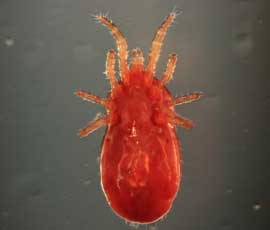Red mite vaccine research gets funding boost

The Biotechnology and Biological Sciences Research Council (BBSRC) has recently awarded a £550,000 research grant to the Moredun Research Institute in Scotland, in collaboration with Pfizer Animal Health, to develop a vaccine to protect hens against red mites.
“Controlling mite populations is now a major problem, with most pesticides affording only limited or short-lived reduction in the population of mites,” said Dr Alasdair Nisbet, who is heading the project at Moredun. “There is also the issue of development of drug resistance and environmental contamination, which means there is an urgent need to develop alternative control strategies.”
The team’s approach is to determine whether it might be possible to vaccinate laying hens using specific extracts of the mites, thus inducing an immune response that will attack and kill the mites when they take a blood meal.
Moredun Research Institute conducts internationally-recognised research on infectious diseases caused by important viruses, bacteria and parasites. It employs 170 scientists and vets that work to improve animal welfare, ensure food safety and reduce adverse effects on the environment. Moredun’s research focuses on understanding the interaction of the disease pathogen with the host species and in developing novel vaccines.
Trial work has actually been ongoing at Moredun since 2006, Dr Nisbet told Poultry World. “Previously, we have been making extracts of red mites and testing them for efficacy as vaccines. Field trails have achieved about 75% death rate among red mites coming into contact with the prototype vaccine, which has been a real positive.
“But clearly cultivating red mites for extracts is not appealing, so this new project with Pfizer and BBSRC is designed to be more commercially oriented.
“Our goal is to identify the bits of the mite that will induce the best immune responses in the hens and produce large quantities of these, using recombinant technologies to enable large-scale vaccination trials to take place.”
The funding is in place for the next three years and a full-time researcher has just been employed. Dr Nisbet said he hoped to have a new prototype vaccine by the end of the funding period, which could then be made commercially.
Infestation of hen houses with red mites is a major health concern of the European poultry industry, with significant economic and productive losses. Night-time attacks on hens can have serious animal welfare implications, leading to anaemia, feather-pecking and an increased incidence of cannibalism.
Dealing with the cost of red mites in poultry
